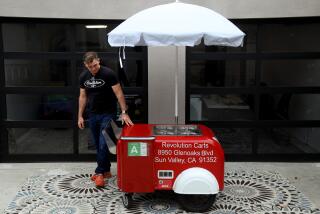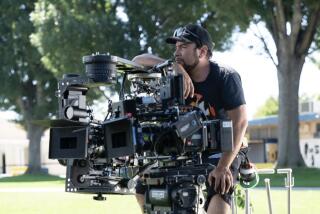Health Probe of Movie Sets Takes a Toll on Snacking
- Share via
Hold the mayo. And the pastrami. Even--gasp--the cappuccino?
Fearful of rumblings from the Los Angeles County health department, movie and TV production companies around town are thinking twice about putting out the traditional spread of finger foods and beverages for grazing by cast and crew members.
The concern has become so pronounced that the crew of at least one TV show, “Diagnosis Murder,” has reluctantly retired its toaster, coffee maker, microwave and the rented cappuccino machine lest it run afoul of county food handling regulations.
“It’s ludicrous,” comedian and series star Dick Van Dyke said about word that the county was cracking down on food preparation on the set. “It’s thoughtless bureaucracy. We have a crew working 16 hours a day. They deserved better than such nonsense.
“They’ve been making coffee on movie sets for more than 80 years,” said Van Dyke, speaking through his publicist. “L.A. has enough trouble keeping production in town. Now this.”
Health officials say such fears are groundless. While they acknowledge a growing interest in on-set culinary offerings, as well as in the use of nonlicensed food vendors, they say there are no plans for a government jihad against snacking on the set.
“We have not issued a bulletin, we have not issued an order that says, ‘Now you’ve got to stop,’ ” said Terrance Powell, a county environmental health specialist.
Food, and lots of it, is a necessity for stars and production employees who work 10 to 15 hours a day, say industry insiders. The spreads are put on by outside caterers or, more often, unionized “craft services” workers, who also help clean up the sets.
Health officials have long winked at such low-level noshing. But in the past year, they’ve taken a closer look as the in-house feasts have become more elaborate, and some cost-conscious companies have switched to unlicensed food vendors.
Drawn by scattered complaints, the health department has found 10 instances of health code violations related to food preparation on the set, said Powell. Problems included bootleg caterers operating out of ill-equipped trucks, and barbecued meats prepared without adequate health controls. Each violation, a misdemeanor, can carry a fine of $1,000 and six months in jail.
Meanwhile, he said, health officials have sought meetings with the various segments of the entertainment industry to emphasize that studios need to hire licensed caterers and to follow established food preparation guidelines--such as making sure the bologna is kept appropriately cold.
Rather than win over the industry, however, the contacts with health officials have created a low-level panic.
In October, the Alliance of Motion Picture and Television Producers sent out a memo to its members warning of “enhanced enforcement” by the health department starting Jan. 1, said Donna Wells, senior vice president at the Entertainment Industry Development Corp., a nonprofit group that promotes filming in Los Angeles.
The producers group did not return telephone calls Thursday. But Wells said: “I can tell you that the memo was somewhat alarmist. . . . The rumors are rampant.”
They haven’t ruined everyone’s appetite. At Fox Broadcasting, head grip Tony Moran said sets used by five production crews were full of food. He reported servings of bacon, eggs, ham, rolls, croissants and fruit.
But at the scene of “Diagnosis Murder,” there is only mourning. Mike McAteer, crafts services crew chief, said the usual buffet of 12 varieties of lunch meats and cheeses, rolls, condiments and fresh cappuccino has devolved into store-bought Starbucks coffee and pre-wrapped snacks.
“We used to have a variety of hearty, healthy foods,” said McAteer. “Now, we’re pretty much restricted to packaged cookies.”
More to Read
The biggest entertainment stories
Get our big stories about Hollywood, film, television, music, arts, culture and more right in your inbox as soon as they publish.
You may occasionally receive promotional content from the Los Angeles Times.










